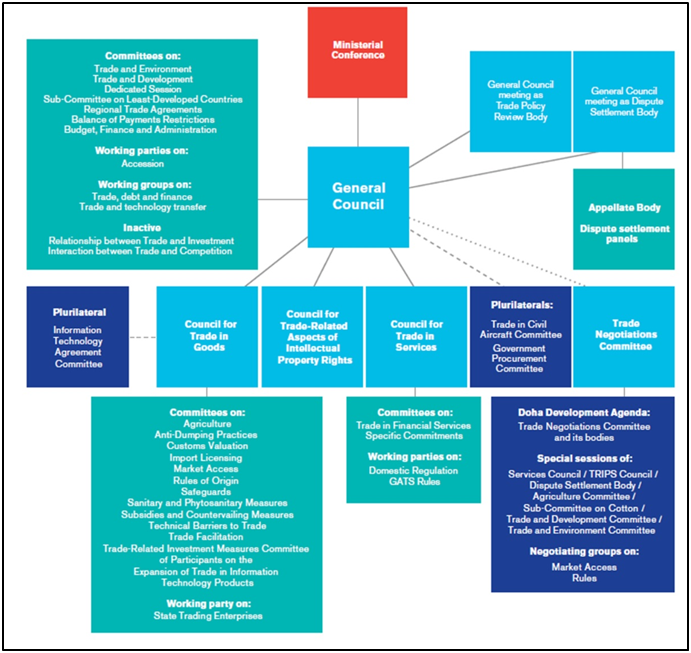Why in news?
- The four-day 13th ministerial conference (MC13) started on February 26 in Abu Dhabi, the United Arab Emirates (UAE).
- The Indian delegation is led by Commerce and Industry Minister Piyush Goyal.
What’s in today’s article?
- WTO
- 13th ministerial conference (MC13) of WTO
- News Summary
About World Trade Organization (WTO)
- WTO is the only global international organization dealing with the rules of trade between nations.
- The goal is to help producers of goods and services, exporters, and importers conduct their business.
- WTO is a forum for governments to negotiate trade agreements. It is also a place for them to settle trade disputes.
- It was created by Uruguay Round negotiations (1986-94) and is headquartered in Geneva.
Functions of WTO
- Administering trade agreements
- Acting as a forum for trade negotiations
- Settling trade disputes
- Reviewing national trade policies
- Building the trade capacity of developing economies
Structure of WTO
- The WTO has 164 members, accounting for 98% of world trade.
- Accession processes for Comoros and Timor-Leste are nearing completion, paving the way for their WTO entry.
- Decisions are made by the entire membership. This is typically by consensus.
- The WTO’s top-level decision-making body is the Ministerial Conference, which meets usually every two years.

13th ministerial conference (MC13) of WTO
- MC13 of WTO will take place from February 26–29, 2024 in Abu Dhabi, United Arab Emirates.
- The conference will bring together trade ministers from around the world to:
- Review the functioning of the multilateral trading system
- Take action on the future work of the WTO
- Chart the future course of the WTO
News Summary: WTO MC13 - Agenda for India
India's agenda at the meeting
- Food security issues
- Under the public stockholding (PSH) programme, the Government procures crops like rice and wheat from farmers at a minimum support price (MSP), and stores and distributes foodgrains to the poor.
- India stresses the need for PSH for its large, vulnerable population and wants a permanent solution from the MC13.
- Food procurement, stockholding, and distribution are crucial to India's food security strategy.
- MSP is normally higher than the prevailing market rates and sells these at a low price to ensure food security for over 800 million beneficiaries.
- However, the WTO's Agreement on Agriculture limits the ability of a government to purchase food at MSP.
- Under global trade norms, a WTO member country's food subsidy bill should not breach the limit of 10 per cent of the value of production based on the reference price of 1986-88.
- As part of the solution, India has asked for measures like amendments in the formula to calculate the food subsidy cap.
- However, developed nations are of the view that such programmes distort global trade prices of food grains.
- Joint Support Initiatives (JSIs) or plurilateral agreements
- India opposes this move being pushed for certain nations.
- E.g., India is strongly opposing the efforts of a group of countries led by China to push a proposal on investment facilitation for development agreement at the WTO.
- India has maintained that this agenda falls outside the mandate of the global trade body.
- Agricultural reforms
- India's stance is to protect farmer livelihoods and ensure equitable market access.
- However, developed nations are pushing to reduce domestic support and increase market openness irrespective of the fact that they provide large subsidies to their rich farmers.
- WTO reforms
- India supports fair reforms that take into account the needs of developing countries.
- This is in response to proposals from developed nations for easier negotiation processes, moving away from unanimous decision-making, and adding non-trade issues to the WTO without agreement from everyone.
- India supports efforts to improve the working of the WTO but its key pillars to be retained. These pillars are:
- special and differential treatment for less developed and developing nations,
- equal voice and
- dispute settlement mechanism.
- India also seeks a revamp of the Appellate Body to ensure fairness.
- Fisheries subsidies
- The members have already reached the first part of the agreement in 2022 under which subsidies will be prohibited for illegal, unreported and unregulated (IUU) fishing.
- Now they are negotiating to curb subsidies that contribute to overfishing and overcapacity to promote sustainable fishing.
- India champions a balanced approach on the principle of common but differentiated responsibilities.
- India, being a low fisheries subsidizer, emphasizes that advanced fishing nations have historically provided substantial subsidies and contributed to fish stock depletion.
- Hence, they should bear more responsibility based on the 'polluter pay principle'.
- India has proposed that:
- developing countries be allowed to give subsidies to their poor fishermen to catch fish till EEZs or up to 200 nautical miles from the shore;
- rich countries engaged in fishing beyond this zone should stop providing any kind of subsidies for the next 25 years.
- Extension of customs duties moratorium on e-commerce trade
- The ongoing moratorium on customs duties on electronic transmissions, in place since 1998, is a contentious issue facing the WTO.
- India, alongside several other developing nations, has historically called for the termination of the moratorium.
- India has specific demands at MC13 to achieve this goal.
- Developed nations, however, are pushing for the permanent adoption of a duty-free flow of digital transmission.
- Barriers to trade
- India would maintain its stand that issues like labour, and environment are non-trade issues and they should not be discussed at the WTO.
- It also emphasised that trade barriers like the EU's carbon tax and deforestation regulation should not be erected under the guise of sustainable development.
- As per India, there are different multilateral forums like in the United Nations where these issues can be discussed.
- Developed countries are also pushing to include women economic empowerment issues in the WTO talks.










